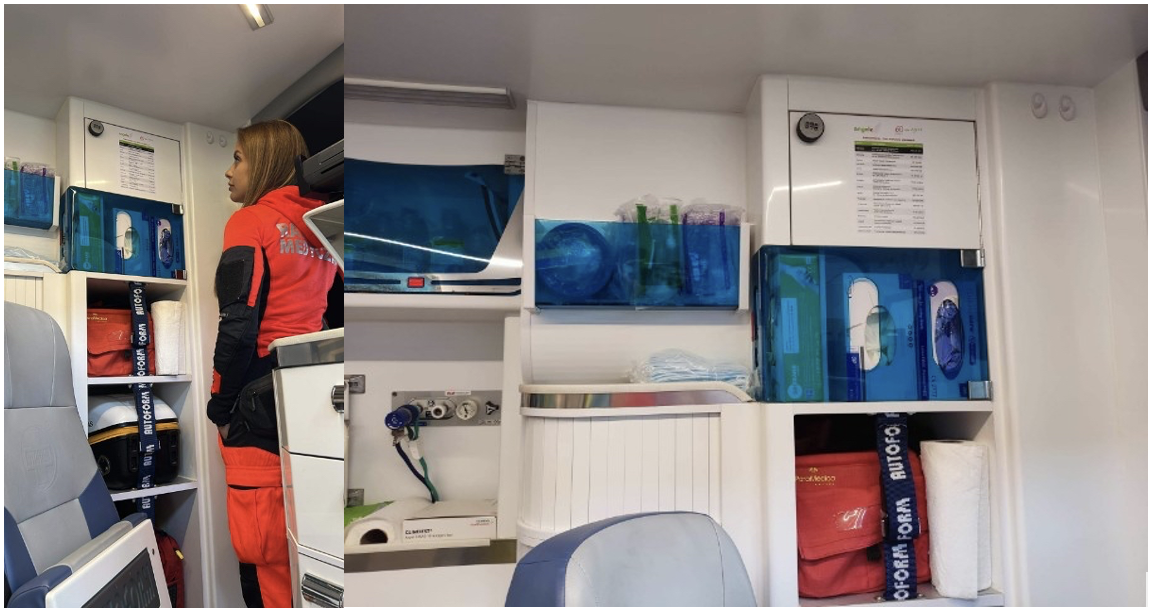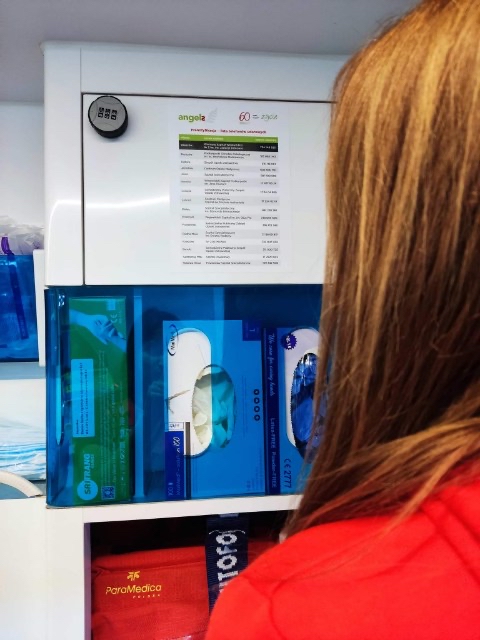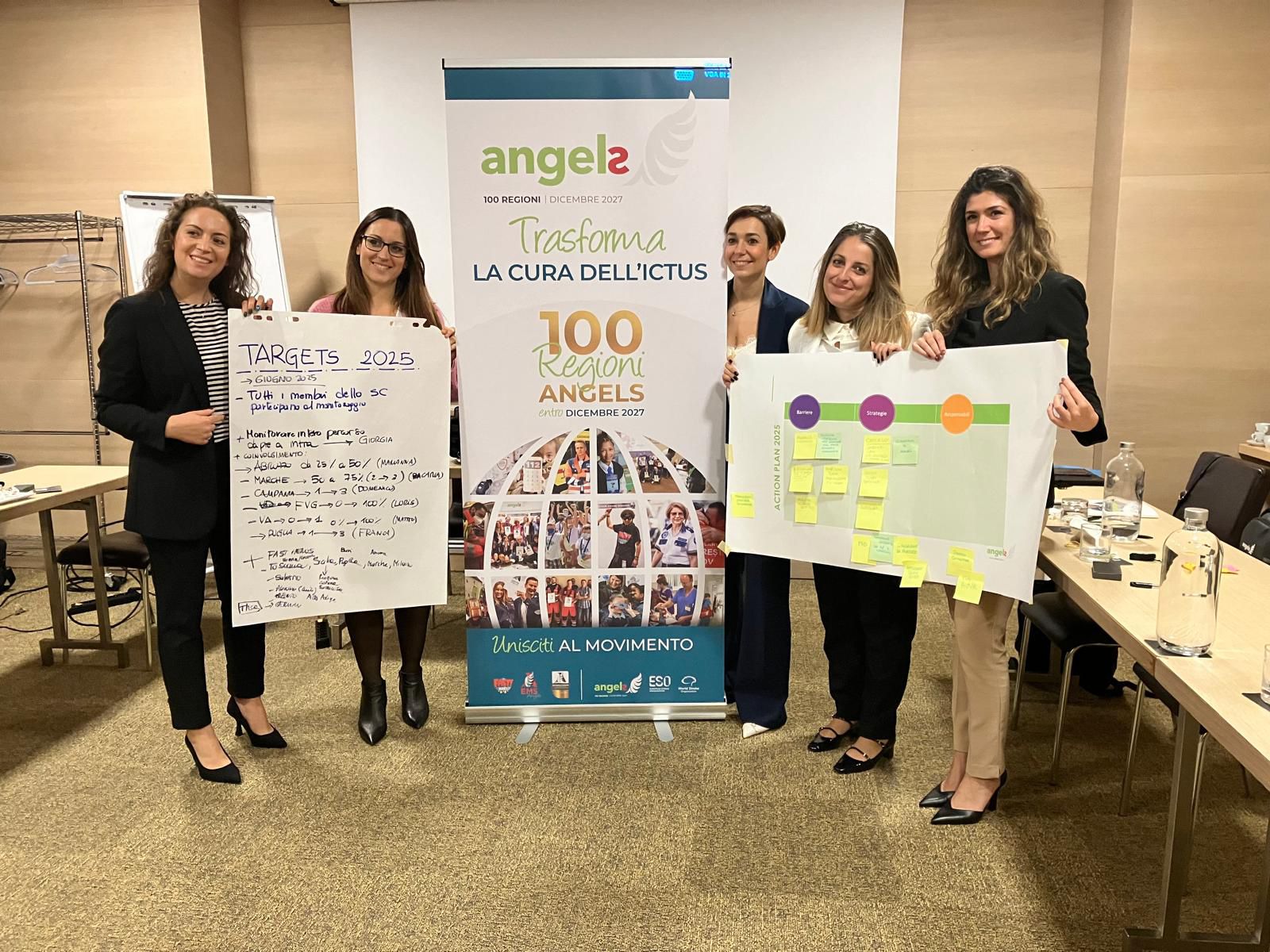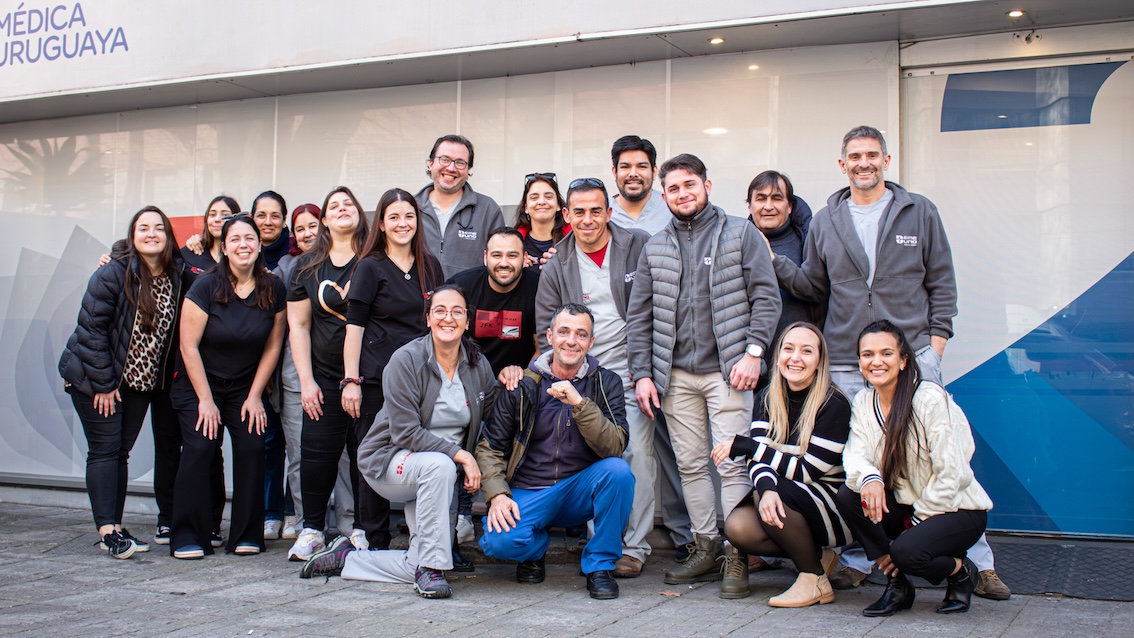
Este un autocolant obișnuit, cu înălțimea de aproximativ 21 cm și lățimea de 15 cm. În colțul din stânga sus se află sigla Angels; cuvintele „60 de minute = viață” apar în dreapta sus, o listă cu 16 numere de telefon mai jos. Autocolantul are un strat subțire de adeziv care, atunci când dezlipiți suportul, se va lipi de aproape orice suprafață – cum ar fi panoul interior al unei ambulanțe, de exemplu.
De fapt, este posibil să găsiți autocolante exact ca acesta în fiecare ambulanță din Podkarpackie, o provincie montană din colțul de sud-est al Poloniei, unde responsabilitatea pentru gestionarea AVC-ului îi revine lui Prof Halina Bartosik-Psujek, care este consultantul neurolog pentru regiune.
Pe 23 martie anul acesta, prof. Bartosik-Psujek a fost încântat să ureze bun venit șefilor departamentului de neurologie din toate cele 16 unități de AVC din provincie la prima întâlnire regională față în față de la începutul pandemiei. Au avut multe de discutat, inclusiv faptul că întârzierile tratamentului apărute din datele regionale de AVC au indicat deficiențe în serviciul serviciilor SMU, unde criza Covid prelungită a perturbat instruirea, a crescut fluctuația personalului și a redus moralul. Personalul din întreaga regiune nu avea capacitatea de a diagnostica AVC decât dacă simptomele erau evidente; nu era utilizată nicio scală de evaluare neurologică și notificarea prealabilă nu era consecventă.
Printre mai multe intervenții care vor rezulta din întâlnirea regională (inclusiv ateliere decizionale, instruire de simulare și implementarea protocolului FeSS), instruirea EMS a prevalat. La sfârșitul lunii aprilie, la mai puțin de patru săptămâni după întâlnirea regională, 60 de membri ai serviciilor medicale de urgență din regiune se vor aduna în capitala regională înfloritoare Rzeszów timp de două zile de instruire intensivă.
Înainte de eveniment, consultantul Angels Katarzyna Putyło a petrecut mult timp la telefon, apelând un anumit set de numere. Feedback-ul pe care l-a primit de la serviciile SMU a indicat că, adesea, apelurile către telefoanele de AVC din unele unități de AVC din regiune nu au primit răspuns. Katarzyna a avut impresia că motivul pentru acest lucru ar putea fi simplu, iar când un număr alarmant de apeluri nu a răspuns, și-a dublat bănuiala: Ar putea cifrele în sine să fie greșite?

O explicație simplă
Ideea că explicațiile simple sunt în general mai bune decât cele complexe este un principiu de rezolvare a problemelor atribuit lui William de la Ockham, matematician și filosof englez, născut cu peste 700 de ani în urmă. „Aparatul de ras al lui Ockham”, așa cum este cunoscut în principiu, susține că cineva trebuie să se aplece către simplitate atunci când construiește o teorie, deoarece explicațiile exagerate adesea îndepărtează una de adevăr.
Unul câte unul, Katarzyna a sunat spitalele din provincia Podkarpackie pentru a întreba: „Care este numărul dvs. de AVC – cel de unde alege cineva?” Răspunsurile au variat. În unele spitale, telefonul mobil pentru AVC a devenit inoperant după ce finanțarea a expirat. Într-un spital de top cu o cale de AVC impresionant de organizată, departamentul de neurologie s-a mutat într-o nouă clădire, iar numărul acestora s-a schimbat.
După ce a verificat sau actualizat numărul fiecărui telefon pentru AVC din Podkarpackie, Katarzyna a aplicat un alt AVC cu aparatul de ras Ockham. „Este de zadar să facem mai mult cu ce se poate face cu mai puțin”, a crezut marele logician. Așadar, în loc să pună problema numerelor de telefon pe ordinea de zi a instruirii sau să elaboreze un nou proces de diseminare a informațiilor actualizate, Katarzyna a comandat suficiente autocolante pentru fiecare ambulanță din provincia Podkarpackie și câteva de rezervă.

Un instrument și un declanșator
De la simptomele de AVC și medicamentele pacienților la scalele neurologice, instruirea oferită de Dr. Rafal Kaczorowskide la Spitalul Clinic Provincial nr. 2 din Rzeszów a acoperit fiecare aspect al fazei prespitalicești, inclusiv o demonstrație video a căii pacientului cu și fără notificare prealabilă. A fost o deschidere pentru echipele a căror cale se termină de obicei la camera de gardă; acestea au fost uimite de diferența pe care o poate face un singur apel telefonic pentru o viață.
Dar dacă videoclipul a făcut cazul pentru notificare prealabilă, autocolantul a făcut și mai multe. A șters barierele din calea implementării instalând în fiecare ambulanță din provincie un instrument și un declanșator pentru o acțiune care salvează vieți. Nu numai că au avut numerele de telefon la îndemână, dar mesajul despre notificare prealabilă a fost imposibil de trecut cu vederea.
După încheierea instruirii, Katarzyna a fost surprinsă să afle care este ținta unei cozi de participanți care fie colectau un autocolant suplimentar pentru un coleg absent, fie împărtășeau propriile sugestii privind modul în care serviciul putea fi îmbunătățit.
Cu angajamentul fiecărei echipe SMU de a notifica în prealabil și al fiecărei unități de AVC de a răspunde la telefon, Katarzyna este satisfăcută că această acțiune prioritară cheie este acum susținută din toate perspectivele – inclusiv cele ale Dr. Kaczorowski și ale Prof. Bartosik-Psujek ale căror reputații formidabile ar trebui să fie mai mult decât suficiente pentru a descuraja încălcarea.
Câștigurile făcute datorită autocolantului au atins deja vița de vie, deoarece mai multe spitale raportează căi mai lină și timpi de tratament mai buni ca urmare a notificării prealabile. Dar pentru a măsura cu adevărat ce poate realiza un autocolant, trebuie să urmăriți Premiile EMS de anul viitor și să căutați echipe de ambulanță din provincia Podkarpackie printre câștigători.



